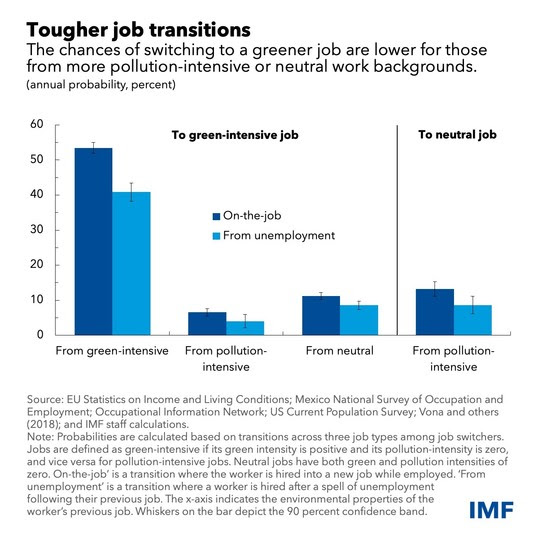The right labor market policies can ease the green jobs transition
Consensus on the need to build a greener economy often founders on concern over potential job losses. It’s one thing to agree that a transition away from fossil fuels is needed. But how easily can a coal miner, say, shift to a job installing solar panels?
The answer shouldn’t be a surprise: for some workers, the change will be difficult. But there is good news. With the right mix of policies, countries should be able to achieve net-zero greenhouse-gas emissions by 2050—while easing the pain for workers in more emissions-intensive industries such as utilities. These policies include job-training programs and investment in green technologies, according to our recent analysis in Chapter 3 of the IMF’s World Economic Outlook.
Achieving emissions objective
Limiting the average global temperature increase to well below 2 degrees Celsius over pre-industrial levels, an objective endorsed by policy makers in the 2015 Paris Agreement, will require a dramatic reduction in net emissions of greenhouse gases. This green transformation will also entail a transformation of the labor market, with jobs moving between occupations and sectors. But the overall magnitude of that shift won’t necessarily be as dramatic as it might seem.
For advanced economies, a policy package designed to put the economy on a path for net zero emissions by 2050 would shift about 1 percent of employment from higher to lower-emissions work over the next decade, our analysis shows. The shift is bigger for emerging markets at about 2.5 percent. Still, those figures are smaller than the shift from manufacturing to services in advanced economies since the mid-1980s. That has come to almost 4 percent of jobs each decade.
As our analysis shows, part of the reason why the employment shifts in advanced economies could be modest is that a minority of jobs are either green-intensive, meaning they improve environmental sustainability (like electrotechnology engineers), or pollution-intensive, meaning they are particularly predominant in highly polluting sectors (like paper mill operators). Most jobs are neutral—neither green- nor pollution-intensive.
Higher wages on greener jobs could also help ease the transition. In our analysis of advanced economies, we find that the average green-intensive job earns about 7 percent more than the average pollution-intensive job, even when skills, gender, and age profiles are controlled for. This is good news, as the premium could attract workers to greener jobs.
Policies to ease adjustment
Nevertheless, workers may still face significant challenges during the transition. Indeed, the data suggest that it is tough to become greener. Our analysis estimates that the probability of an individual moving from a pollution-intensive to a green-intensive job is between 4 percent and 7 percent.
The odds are slightly better for someone moving from neutral to green—9 percent to 11 percent. In contrast, the chance of finding a green-intensive job, if your last job was also green, is much higher at around 41 percent to 54 percent. This doesn’t mean that workers in pollution-intensive jobs have no chance of finding greener employment, but they may need some help.

This explains why it is so important to craft labor-market policies that can help shift the balance toward greener jobs and ease the transition for workers. That means boosting workers’ ability to find greener jobs—through offering training programs—and reducing the incentives to stay in more pollution-intensive occupations. This includes gradually rolling back the job retention support introduced early in the pandemic as the recovery takes hold, since such policies can weaken incentives to change jobs.
Which brings us back to the policy package that, our model-based analysis suggests, can help economies achieve net zero emissions by 2050. It has four elements:
- An initial green infrastructure and R&D investment push starting in 2023, with spending gradually reduced after 2028. This would support a modest productivity increase in less emissions-intensive sectors.
- A tax on carbon emissions rising gradually from 2023, with a sharper increase from 2029 onwards. This raises the relative price of more emissions-intensive goods and spurs growth in less emissions-intensive sectors.
- A training program to help less-skilled workers move to greener sectors, starting in 2023. The training would help address distributional concerns by increasing the productivity of lower-skilled workers in low-emissions sectors, encouraging firms to hire them and raise their wages.
- An earned-income tax credit (EITC), which reduces taxes owed by lower-income workers. This would start in 2029 and offset the impact of the carbon tax on those workers. It would also encourage more people to enter the workforce.

For the representative advanced economy, we estimate that the policy package generates a labor reallocation to greener industries of about 1 percent over 10 years. It also increases total employment by 0.5 percent and boosts after-tax income for lower-skilled workers, reducing inequality.
Emerging markets
The impact would be somewhat different for emerging-market economies, where a higher proportion of workers are employed in sectors such as mining. It would generate a shift of 2.5 percent of the workforce over 10 years. There would be an overall increase in employment in the near term as green investments kick in, but that would change to a 0.5 percent decline by 2032.
Also, emerging economies generally have more employment in so-called informal sectors, where income taxes aren’t always paid. Therefore, the package would have to be supplemented by direct cash transfers to low-income workers starting in 2029, alongside the EITC and the carbon tax.
Policy actions are essential to provide incentives for the transition to a net-zero economy by 2050. Correctly timed and implemented, these actions can ease the switch to greener jobs for a relatively modest segment of the workforce while also boosting skills and incomes for the lowest paid workers and reducing inequality. This will ensure that the path towards a greener economy is also an inclusive one.








